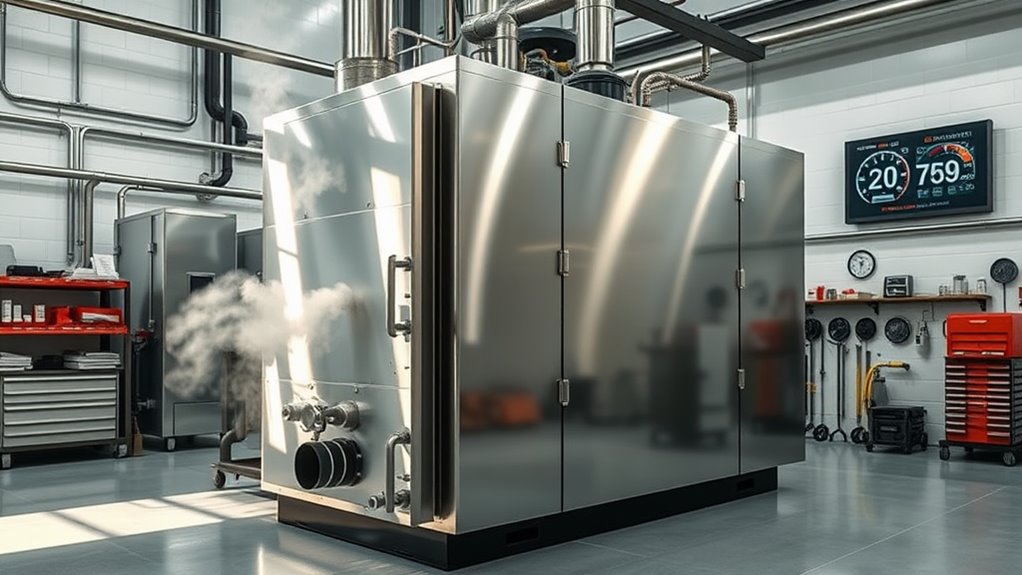The life expectancy of a commercial boiler typically ranges from 15 to 30 years, provided you maintain it properly. Regular upkeep is vital, as factors like operational conditions and maintenance practices can greatly affect longevity. Neglecting your boiler can lead to increased energy bills and frequent breakdowns. By recognizing when repairs are needed, you can extend your boiler's lifespan and improve its efficiency. Explore essential maintenance tips and indicators for replacement to further enhance your boiler's performance.
Key insights
- The average lifespan of a commercial boiler ranges from 15 to 30 years with proper maintenance and care.
- Higher efficiency models tend to have a longer operational life compared to standard models.
- Regular maintenance practices significantly extend the lifespan and prevent costly repairs and downtime.
- Indicators for replacement include being over 15 years old, frequent repairs, and decreased efficiency.
- Continuous performance monitoring helps identify issues early, contributing to the boiler's longevity and reliability.
Understanding Commercial Boilers
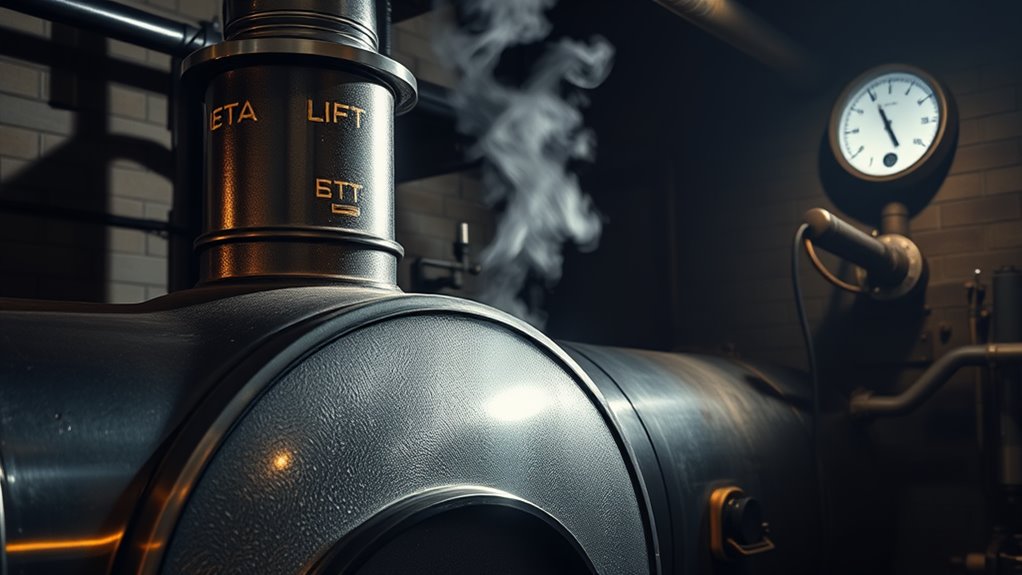
Commercial boilers are essential components in many industrial and commercial settings, providing fundamental heating and hot water. Understanding the various boiler types—such as fire-tube, water-tube, and condensing boilers—is important for peak performance. Each type has unique characteristics that influence efficiency, capacity, and application suitability. When considering installation requirements, you must account for factors like space, fuel source, and local regulations. Proper sizing and placement are critical for maximizing efficiency and guaranteeing safety. Additionally, installation must adhere to manufacturer specifications and local codes to avoid operational issues. By grasping these aspects, you can guarantee that your commercial boiler operates effectively and meets your facility's heating demands. Furthermore, selecting a boiler with advanced technology can enhance energy efficiency and reduce operational costs significantly.
Average Lifespan of Commercial Boilers
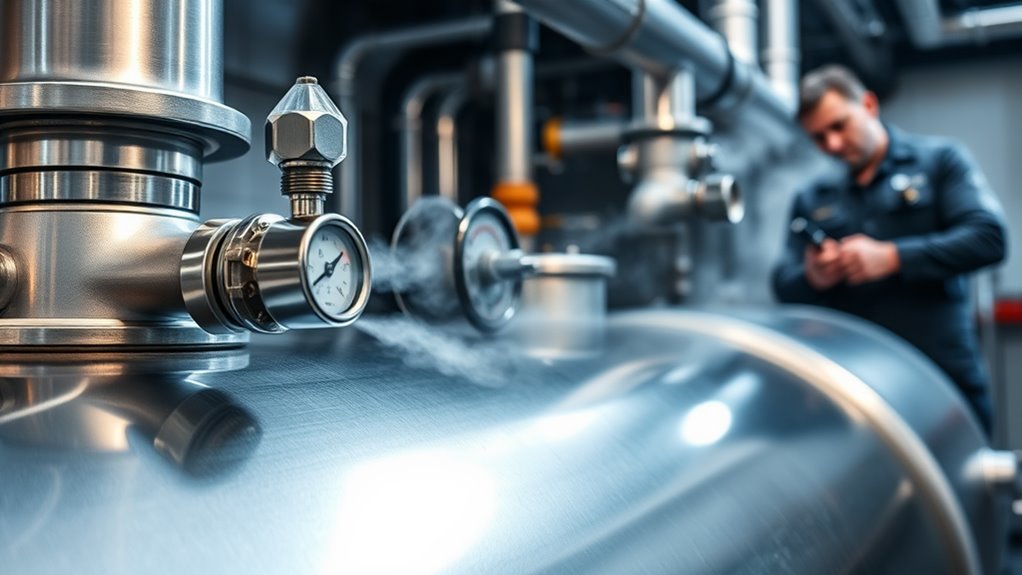
While various factors influence the average lifespan of commercial boilers, most units typically last between 15 to 30 years with proper maintenance. This lifespan comparison highlights the importance of boiler efficiency; higher efficiency often correlates with a longer operational life. Regular maintenance practices, such as cleaning and inspections, directly impact both efficiency and longevity. You'll find that older models might operate less efficiently, leading to increased wear and tear. In contrast, newer technologies often enhance efficiency, contributing to a more extended lifespan. Keep in mind that neglecting routine checks can greatly reduce your boiler's operational years. Ultimately, prioritizing maintenance not only boosts boiler efficiency but also maximizes its lifespan, ensuring you get the most value from your investment. Regular servicing ensures safe and efficient operation, which is crucial for extending the life of your boiler.
Factors Affecting Boiler Lifespan
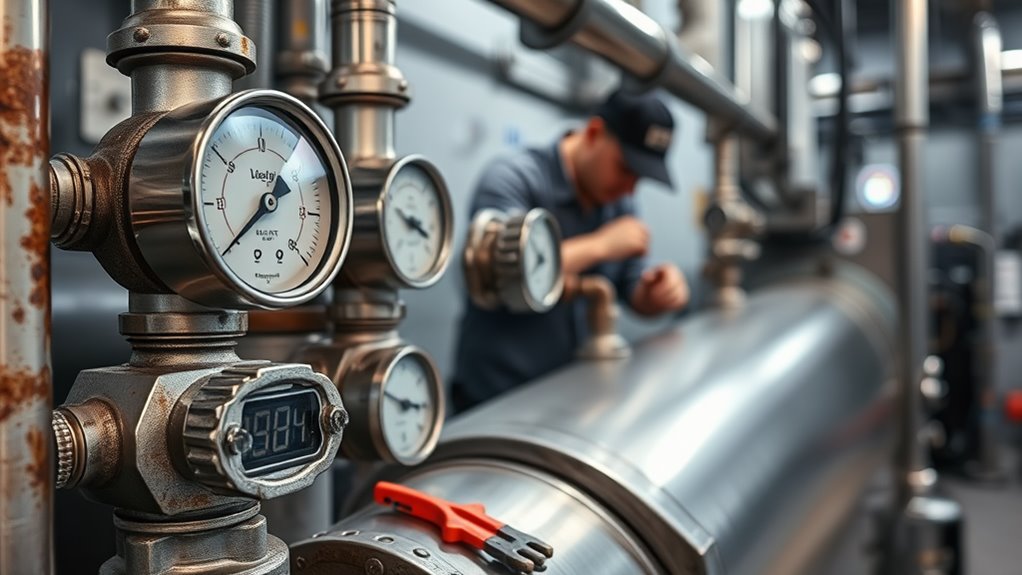
Your boiler's lifespan hinges markedly on maintenance practices and operating conditions. Regular inspections and timely repairs can prevent costly failures, while extreme temperatures and pressure fluctuations can accelerate wear. Understanding these factors allows you to optimize performance and extend the service life of your equipment. Implementing a preventative maintenance plan is essential for identifying issues before they lead to significant damage.
Maintenance Practices
Regular maintenance practices greatly influence the lifespan of a commercial boiler. Implementing consistent boiler cleaning routines removes scale and soot buildup, which can hinder efficiency and lead to overheating. You should establish detailed inspection schedules to monitor key components like pressure vessels, valves, and pumps. Regular inspections help identify issues early, preventing costly repairs and extending the boiler's operational life. Additionally, maintaining proper water chemistry and performing routine safety checks are essential for guaranteeing peak performance. By adhering to these best practices, you can greatly enhance the reliability and longevity of your boiler system. Ultimately, a proactive approach to maintenance not only safeguards your investment but also guarantees compliance with safety regulations. Furthermore, incorporating commercial power flush into your maintenance routine can significantly improve system efficiency and reduce the risk of breakdowns.
Operating Conditions
Operating conditions play an essential role in determining the lifespan of a commercial boiler, as factors such as load demand, fuel quality, and ambient temperature directly impact its performance and durability. To guarantee peak operation and longevity, consider these factors:
- Load Demand: Consistent and appropriate load levels prevent excessive strain.
- Fuel Quality: High-quality fuel reduces deposits and corrosion.
- Ambient Temperature: Extreme temperatures can affect thermal efficiency and wear.
- Pressure Levels: Maintaining proper pressure levels is critical to prevent failures. Additionally, regular maintenance ensures systems meet current safety and environmental standards, enhancing reliability and reducing the likelihood of unexpected failures.
Importance of Regular Maintenance
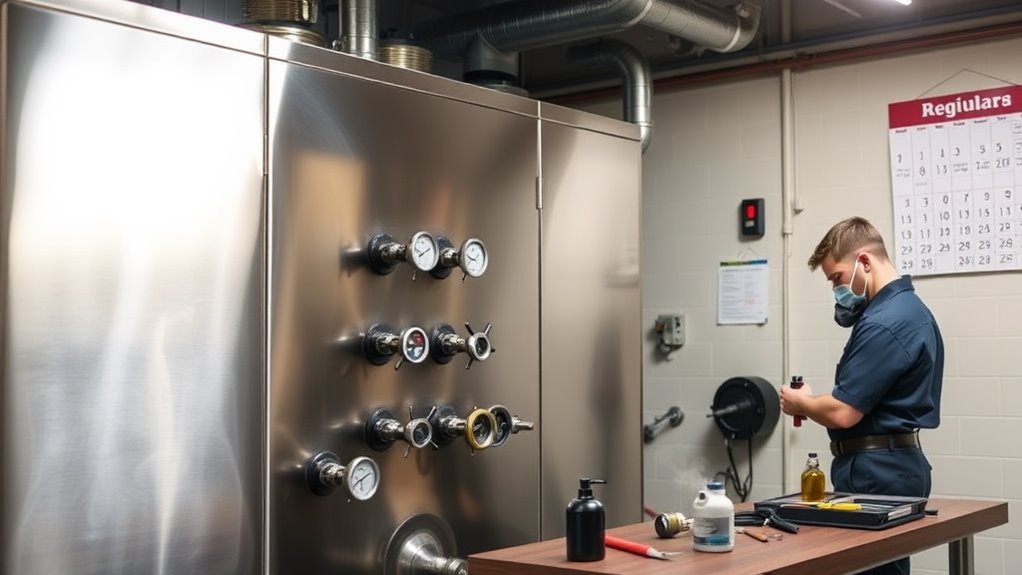
Regular maintenance is essential for maximizing your commercial boiler's lifespan and efficiency. By implementing preventative maintenance practices, you can avoid costly repairs and downtime. Additionally, recognizing the signs of neglect helps guarantee that your boiler operates safely and effectively. Furthermore, routine maintenance is crucial for ensuring optimal performance and longevity of your heating systems.
Preventative Maintenance Benefits
While neglecting preventative maintenance might save time in the short term, it can lead to considerable issues for your commercial boiler over time. Implementing effective preventative strategies and proper maintenance scheduling can enhance your boiler's efficiency and longevity. Here are four key benefits of regular maintenance:
- Cost Savings: Regular maintenance helps identify minor issues before they escalate into costly repairs.
- Increased Efficiency: A well-maintained boiler operates efficiently, reducing energy consumption and costs.
- Safety Assurance: Routine inspections help prevent hazardous malfunctions, ensuring your workplace remains safe.
- Extended Lifespan: Consistent upkeep considerably prolongs the operational life of your boiler, maximizing your investment.
Additionally, regular checks support compliance with Commercial Gas Safety Certificates, ensuring your business adheres to legal safety standards.
Investing in preventative maintenance pays off by safeguarding your equipment and your budget.
Common Maintenance Practices
To guarantee your commercial boiler operates at peak performance, it is vital to implement common maintenance practices that address potential issues before they arise. Regular boiler cleaning is significant, as it removes sediment and debris that can hinder efficiency. Schedule these cleanings based on your operational demands and manufacturer recommendations. Additionally, don't overlook the importance of timely system upgrades, which can enhance energy efficiency and prolong your boiler's lifespan. Monitor components such as valves, pumps, and controls for wear and replace them as needed. By committing to these maintenance practices, you'll not only secure optimal operation but also minimize unexpected breakdowns, ultimately safeguarding your investment in the boiler system and enhancing overall productivity. Furthermore, regular maintenance helps prevent error codes and enhances boiler longevity.
Signs of Neglect
Neglecting the maintenance of your commercial boiler can lead to significant operational issues and costly repairs. Identifying signs of neglect early guarantees that you address problems before they escalate. Here are four key indicators to watch for:
- Unusual Noises: Rumbling or banging can signal neglected components needing attention.
- Increased Energy Bills: A sudden spike may indicate inefficiencies due to lack of regular inspections.
- Water Leaks: Any moisture around the boiler hints at potential failure if not addressed promptly.
- Error Codes: Frequent alerts on your control panel often point to neglected maintenance.
Regular inspections are essential for identifying these signs and guaranteeing your boiler operates efficiently, extending its lifespan and reducing repair costs. Additionally, being aware of common error codes can help in early detection of issues that may arise from neglecting maintenance.
Signs Your Boiler Needs Replacement
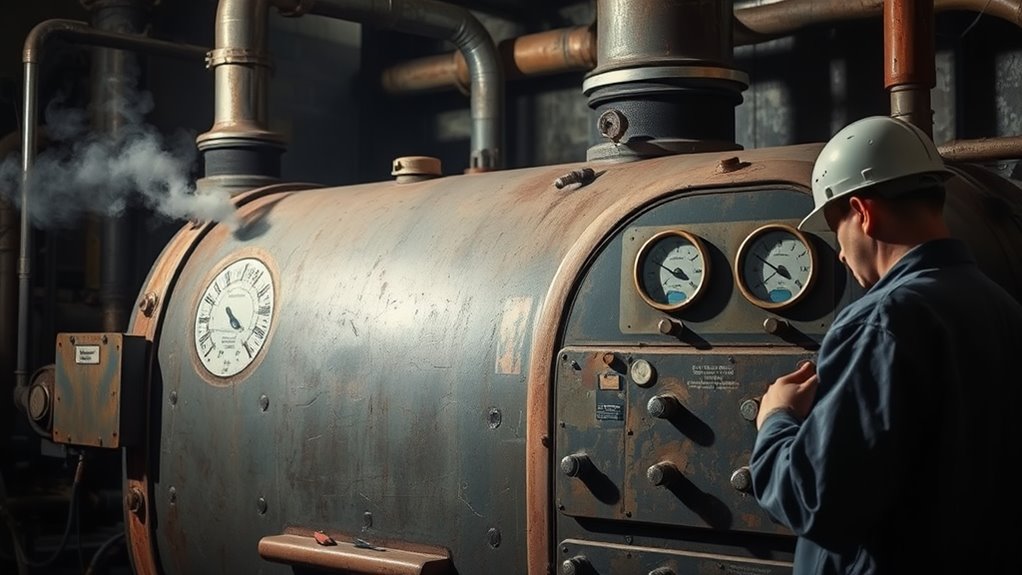
When your boiler starts showing signs of decline, it's crucial to act quickly to avoid costly repairs or service interruptions. Key boiler age indicators include unusual noises, inconsistent heating, or noticeable leaks. If your boiler's efficiency has markedly decreased, it may be time to contemplate replacement. Additionally, frequent repairs can signal that the unit is nearing the end of its lifespan, leading to higher replacement costs over time. A boiler that's over 15 years old typically requires more maintenance and could be less energy-efficient. Monitoring these signs can save you from unexpected breakdowns and guarantee a more reliable heating system. Don't ignore these indicators; addressing them early can lead to better long-term outcomes. Regular inspection and preventive maintenance tips can also help extend your boiler's lifespan and performance.
Different Types of Commercial Boilers
When it comes to commercial boilers, understanding the different types is essential for efficient operation. Fire-tube boilers offer robust performance, while water-tube boilers provide versatility in high-pressure applications. Condensing boilers, on the other hand, enhance energy efficiency by utilizing exhaust heat, making them a popular choice in modern systems.
Fire-Tube Boilers Overview
Fire-tube boilers are a popular choice in commercial applications due to their efficiency and design simplicity. Their fire tube design allows for effective heat transfer, making them highly efficient. Here are four key aspects you should know about fire-tube boilers:
- Heat Exchange: The hot gases travel through tubes immersed in water, optimizing fire tube efficiency.
- Cost-Effective: They typically have lower installation costs compared to other boiler types.
- Ease of Maintenance: Their design simplifies maintenance, contributing to longer service life.
- Versatility: Fire-tube boilers are suitable for various applications, from small businesses to large industrial facilities.
Understanding these features helps you appreciate why fire-tube boilers remain a reliable option in commercial settings.
Water-Tube Boilers Features
Water-tube boilers are an essential type of commercial boiler, distinguished by their unique design and operational efficiency. In a water tube design, water flows through tubes that are heated externally by the combustion gases. This configuration allows for rapid heat transfer and efficient steam production. You'll find that water-tube boilers can operate at higher pressures and temperatures compared to fire-tube counterparts, showcasing significant efficiency advantages. Their ability to quickly respond to load changes makes them ideal for industries requiring consistent performance. Additionally, the design minimizes the risk of overheating and scaling, contributing to longevity. Understanding these features can help you select the right boiler for your commercial needs, ensuring peak performance and reliability.
Condensing Boilers Benefits
Among the various types of commercial boilers, condensing boilers stand out for their energy efficiency and environmental benefits. By utilizing the heat from exhaust gases, these boilers maximize energy savings while minimizing their environmental impact. Here are four key advantages of condensing boilers:
- Higher Efficiency: They can achieve efficiency ratings exceeding 90%, resulting in significant fuel savings.
- Lower Emissions: Reduced greenhouse gas emissions contribute to a smaller carbon footprint.
- Cost-Effective Operation: Long-term energy savings translate to lower operating costs, enhancing your bottom line.
- Versatility: Suitable for various applications, they can adapt to different heating needs effectively.
Investing in a condensing boiler not only boosts operational efficiency but also promotes sustainability.
Tips for Extending Boiler Life
To guarantee your commercial boiler operates efficiently and lasts longer, implementing regular maintenance practices is essential. Schedule routine inspections to identify potential issues early. Monitoring water quality and adjusting for different fuel types can help prevent corrosion and scaling. Consider timely boiler upgrades, as modern systems can enhance efficiency and reduce wear and tear. Regularly clean and service the burner, ensuring peak combustion and minimizing emissions. Additionally, check and calibrate controls to maintain proper operating conditions. Address any leaks or unusual noises immediately, as these can indicate underlying problems. By adhering to these practices, you'll not only extend your boiler's lifespan but also improve its overall performance and reliability.
Cost Considerations for Boiler Replacement
When evaluating a boiler replacement, you'll need to weigh various cost factors that can greatly influence your budget. Effective cost analysis is crucial for successful budget planning. Here are four key components to contemplate:
- Initial Purchase Price: Compare models and brands, as prices can vary considerably.
- Installation Costs: Factor in labor and any necessary modifications to your existing system.
- Maintenance Expenses: Anticipate ongoing maintenance costs to guarantee long-term reliability.
- Operating Costs: Reflect on the efficiency of the new boiler, as this will affect your energy bills.
Energy Efficiency and Its Impact on Longevity
Energy efficiency plays an essential role in determining the longevity of a commercial boiler, as more efficient systems tend to experience less wear and tear over time. By investing in energy efficient technologies, you reduce operational stress on components, leading to fewer breakdowns and extended life cycles. Sustainable practices, such as regular maintenance and proper system sizing, further enhance efficiency, ensuring peak performance. When a boiler operates efficiently, it maintains stable temperatures and pressure levels, minimizing the risk of damage from thermal cycling. Additionally, energy efficient boilers often incorporate advanced controls that optimize fuel usage, contributing to lower emissions. To sum up, prioritizing energy efficiency directly affects your boiler's lifespan, ultimately saving you money and resources in the long run.
The Role of Professional Inspections
Beyond energy efficiency, the role of professional inspections cannot be overlooked in extending the lifespan of a commercial boiler. Regular evaluations are essential for identifying potential issues before they escalate. Here's why you should prioritize the importance of inspections:
- Preventative Maintenance: Regular inspections can spot wear and tear, preventing costly breakdowns.
- Safety Assurance: Evaluations guarantee your system operates safely, protecting both personnel and property.
- Regulatory Compliance: Inspections help you adhere to local codes, avoiding potential fines.
- Optimized Performance: Frequent evaluations enhance efficiency, reducing energy costs in the long run.
Frequently Asked Questions
How Can I Tell if My Boiler Is Energy Efficient?
To determine if your boiler's energy efficient, check its energy ratings. Look for the annual fuel utilization efficiency (AFUE) percentage—higher percentages indicate better efficiency. Regular boiler maintenance also plays an essential role; guarantee it's serviced annually to keep it running at peak performance. Inspect for leaks or unusual noises, as these can signify inefficiencies. By combining energy ratings with diligent maintenance, you can assess and improve your boiler's energy efficiency effectively.
What Insurance Covers Commercial Boiler Replacement Costs?
When considering insurance for your commercial boiler, you'll want to explore boiler insurance that specifically includes replacement coverage. This type of policy typically covers the costs associated with replacing a damaged or malfunctioning boiler. Be sure to review the terms carefully, as coverage can vary considerably between policies. It's essential to assess the limits on replacement costs and any exclusions that might affect your claims in the event of a failure.
Can I Install a Commercial Boiler Myself?
You might be tempted to install a commercial boiler yourself, but it's essential to understand the installation requirements first. DIY considerations include local codes, safety regulations, and the complexity of the system. Boilers often require specialized knowledge for proper installation to guarantee efficiency and safety. If you lack experience, it's advisable to hire a professional. This not only assures compliance but also protects your investment and avoids potential hazards down the line.
Are There Government Incentives for Upgrading Boilers?
Yes, there are government incentives for upgrading boilers, often in the form of rebates. These programs aim to encourage energy efficiency and reduce emissions. By upgrading to a more efficient boiler, you not only lower your operating costs but may also become eligible for significant financial benefits. Check your local government's website or speak with your energy provider to find specific programs available in your area, and maximize your savings while enhancing your system's performance.
What Are the Environmental Impacts of Old Boilers?
Old boilers considerably contribute to environmental issues through high boiler emissions and energy waste. These outdated systems often operate inefficiently, releasing harmful pollutants into the atmosphere and consuming more fuel than necessary. As they age, the potential for leaks and malfunctions increases, exacerbating their negative impact. Upgrading to modern, efficient boilers can drastically reduce emissions and energy waste, promoting both environmental sustainability and compliance with increasingly stringent regulations.
Summary
In conclusion, understanding the life expectancy of your commercial boiler is vital for effective management and budgeting. With an average lifespan of 15 to 30 years, factors like maintenance and operational conditions greatly influence longevity. Regular inspections and timely replacements can prevent costly downtime. By prioritizing efficiency and addressing signs of wear, you can enhance your boiler's performance and lifespan. Ultimately, investing in professional services guarantees your system operates at its best, maximizing both safety and efficiency.

